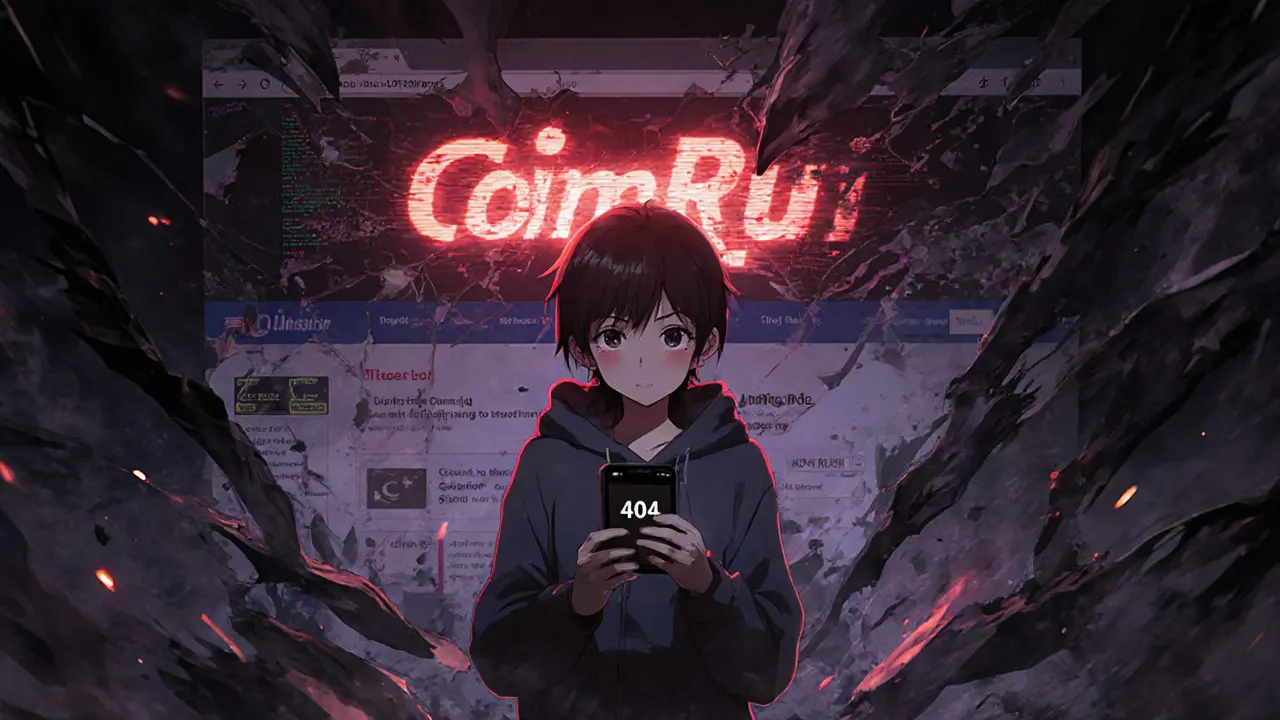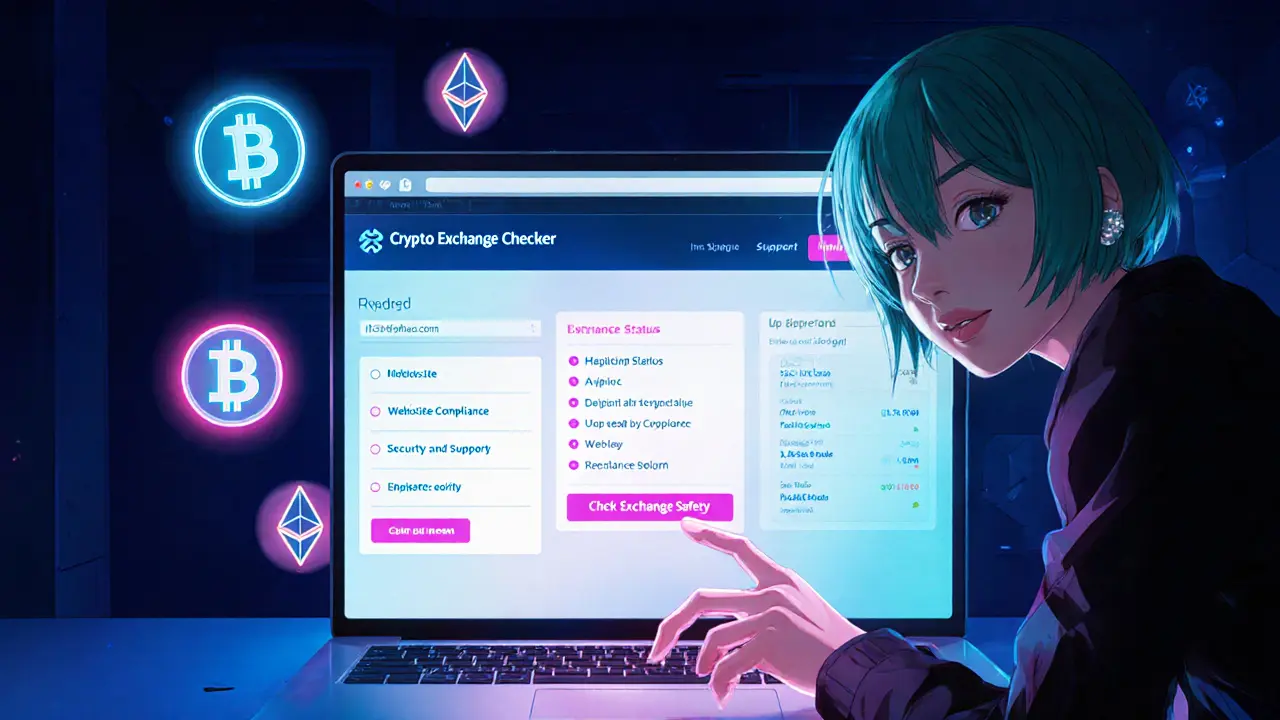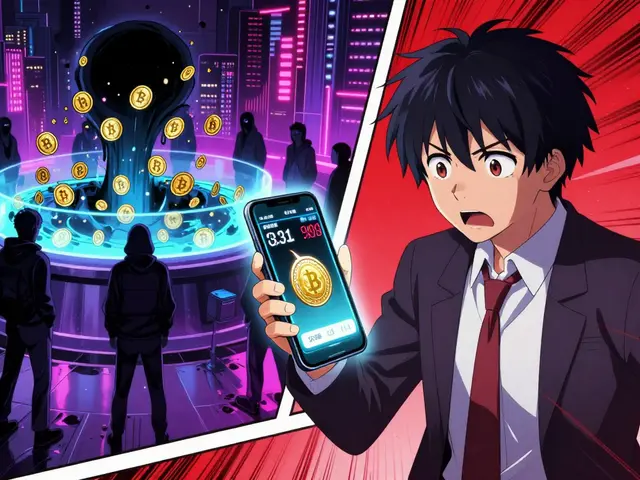Crypto Exchange Checker
Enter details about a cryptocurrency exchange to check its current status and safety:
TL;DR
- CoinRui stopped trading years ago - the website is offline and support is dead.
- There are no fee tables, security claims, or listed trading pairs for CoinRui.
- Major exchanges like Coinbase, Kraken and Binance US still operate with transparent fees and strong security.
- Former CoinRui users report lost funds and no way to recover them.
- Avoid unregulated, inactive platforms - stick to exchanges that provide regulatory compliance and active customer service.
If you typed "CoinRui" into a search bar hoping to find a place to swap Bitcoin for alt‑coins, you’ll probably hit a dead end. This CoinRui review explains why the exchange vanished, what the fallout looks like for anyone who traded there, and how you can protect yourself by choosing a reliable platform.
What is CoinRui?
CoinRui was marketed as a cryptocurrency exchange that let users trade a handful of digital assets through a web‑based interface. The service launched sometime before 2020, but it never gained the traction of larger rivals. Its branding promised fast trades and low fees, yet no concrete fee schedule or security whitepaper ever surfaced.
From Active Platform to Defunct Service
According to a detailed assessment posted on July 17, 2021, the exchange began showing signs of decay well before it finally disappeared. Users reported "lower orders" appearing on the market view, and the core infrastructure - the so‑called "nuts and bolts" - seemed to be stripped away piece by piece. By mid‑2021 the main landing page stopped loading, and the domain eventually went dark.
There are no official statements from the company about a shutdown or bankruptcy. Instead, the silence itself became the final indicator: no social media updates, no support email replies, and no community forums. In short, CoinRui chose to "close the gathering" without a graceful wind‑down plan.
How Does CoinRui Stack Up Against Working Exchanges?
| Exchange | Status (2025) | Supported Cryptos | Typical Fees | Security Protocols | Customer Support |
|---|---|---|---|---|---|
| CoinRui | Defunct - website offline | Undocumented (few pairs) | Undisclosed | None publicly stated | No active channels |
| Coinbase | Operational - US‑regulated | 235+ | 0%‑3.99% (maker/taker) | 2‑factor auth, cold storage, insurance | 24/7 live chat, phone, email |
| Kraken | Operational - global | 350+ | 0%‑0.4% (maker/taker) | Cold storage, SOC2 compliance | Email, live chat, extensive knowledge base |
| Binance US | Operational - US‑focused | 158+ | 0%‑0.6% (maker/taker) | SAFU fund, multi‑sig wallets | Live chat, ticket system, community forums |
The table makes it clear: CoinRui offers none of the safety nets that modern traders expect. While Coinbase, Kraken, and Binance US all publish transparent fee schedules, maintain cold‑storage vaults, and provide multiple support channels, CoinRui vanished without a trace.

Real‑World Impact on Users
When an exchange shuts down abruptly, the biggest pain point is locked‑up funds. The 2021 review from Revain.org notes that "an enormous number of clients started to lose access and a few misfortunes were recorded." Users described watching their balances freeze as the login page stopped responding, then receiving the dreaded "404 - page not found" when trying to withdraw.
Because there was no escrow, no insurance, and no regulatory overseer, affected traders have no legal recourse to retrieve their assets. In many cases, the lost funds remain on an inaccessible server that no longer has an administrator to unlock it. The consensus among the few forums that still discuss CoinRui is that recovery is virtually impossible.
Key Lessons: How to Avoid a Similar Nightmare
- Check regulatory compliance. Look for exchanges registered with a financial authority (e.g., FinCEN, FCA, ASIC). Compliance forces the platform to keep detailed records and maintain user fund segregation.
- Verify security practices. Two‑factor authentication, cold storage percentages, and third‑party audits are non‑negotiable for a trustworthy service.
- Read the fee structure up front. Transparent maker/taker fees help you calculate costs and spot hidden charges.
- Test customer support. Send a test inquiry before depositing large sums. Prompt, knowledgeable replies are a good sign.
- Stay updated on platform news. Active social media, blog posts, and community channels indicate an engaged team.
What Should Former CoinRui Users Do Now?
If you still have a CoinRui account, the first step is to try the archived version of the site via the Wayback Machine. Sometimes the withdrawal function remains functional in older snapshots. If that fails, consider the following actions:
- Document every email, transaction ID, and screenshot you have - this will be useful if you decide to file a complaint with consumer protection agencies.
- Report the incident to your local financial regulator. In New Zealand, that would be the Financial Markets Authority (FMA). While they may not have jurisdiction over a foreign exchange, the report adds to the public record.
- Monitor any announcements from the domain’s registrar. Occasionally, a defunct exchange resurfaces under new ownership, offering a limited redemption period.
Most importantly, move any remaining crypto holdings to a reputable wallet or exchange that meets the criteria listed above.
Why CoinRui Serves as a Cautionary Example
In the rapidly evolving world of digital assets, the market is now dominated by a handful of exchanges that invest heavily in compliance, security, and user education. Smaller players like CoinRui, which failed to establish clear policies and robust infrastructure, are often the ones that disappear, taking user funds with them.
The lesson isn’t just “avoid unknown names.” It’s about demanding the same baseline protections you would expect from a traditional bank: clear fees, secure storage, and a responsive support team. When those basics are missing, the risk of losing your money skyrockets.
Frequently Asked Questions
Is CoinRui still operational in 2025?
No. The website is offline, and there are no active support channels. All evidence points to a permanent shutdown that began in 2021.
Can I recover funds that were on CoinRui?
Recovery is unlikely. If the withdrawal page still works via an archived snapshot, you might try it, but most users report permanent loss.
What should I look for in a safe crypto exchange?
Choose an exchange that is regulated, publishes its fee schedule, uses cold storage for the majority of assets, offers two‑factor authentication, and provides 24/7 customer support.
Are there any ongoing legal actions against CoinRui?
Public records do not show any bankruptcy filings or class‑action lawsuits as of September2025. The lack of legal activity further confirms the exchange’s dormant state.
How do Coinbase, Kraken, and Binance US differ in fees?
Coinbase charges 0%‑3.99% depending on the transaction type, Kraken offers a tight 0%‑0.4% spread, and Binance US sits between them at 0%‑0.6%. All three publish their fee tables online.







Comments
Kate Roberge
October 1, 2025 AT 01:17 AMI’ve been watching crypto news for years and CoinRui sticks out like a bad haircut.
The whole operation looked like a paper‑thin startup that never bothered to get proper licenses.
Its 'fast trades' promise turned out to be nothing more than glossy marketing fluff.
When the website vanished in 2021, the silence was louder than any public apology.
No regulatory filing, no bankruptcy notice, just a dead domain.
That’s a classic red flag for anyone who cares about capital preservation.
Users who left money there basically handed their funds to a ghost.
The fact that there was never a transparent fee schedule means you never knew what you were actually paying.
Even the security claims were vague – no mention of cold storage or audits.
In contrast, the big players publish their security audits annually.
The community tried to raise alarms on forums, but the response was a tumbleweed.
By the time people realized the withdrawal page was dead, the assets were already locked.
Trying the Wayback Machine is a gamble you shouldn’t have to take.
If you’re looking for a safe harbour, stick to regulated exchanges that actually keep user funds segregated.
Those platforms also have customer support that actually answers emails.
Bottom line: CoinRui is a cautionary tale – avoid it like the plague.
VICKIE MALBRUE
October 3, 2025 AT 22:44 PMGood thing we’ve got solid exchanges that actually work.
Waynne Kilian
October 6, 2025 AT 20:10 PMHonestly, I think it’s worth looking at the bigger picture – even if the info is a little messy. The crypto space is still kinda wild, and every new platform teaches us something, even the failures. I guess the lesson here is to stay curious and not just follow the hype, you know?
Naomi Snelling
October 9, 2025 AT 17:37 PMWhat if the whole “shutdown” was staged to hide a massive off‑chain vault? The lack of any official statement feels like a cover‑up, and I wouldn’t be surprised if the founders moved the assets elsewhere under a different brand. Keep your eyes open and never trust a silent exit.
Michael Wilkinson
October 12, 2025 AT 15:04 PMYour optimism is cute but frankly unrealistic – people need to stop acting like crypto is a magic cure‑all.
Billy Krzemien
October 15, 2025 AT 12:30 PMLook, I get where you’re coming from, but it’s important to stay factual. The data we have shows clear red flags, and educating newcomers about due diligence can prevent these losses.
april harper
October 18, 2025 AT 09:57 AMAnother dead exchange, another cautionary tale – the crypto world loves to repeat the same mistakes over and over again.
Carl Robertson
October 21, 2025 AT 07:24 AMHonestly, you’re just recycling the same tired narrative. People should be ashamed for still mentioning CoinRui when there are far better options out there.
Rajini N
October 24, 2025 AT 04:50 AMI understand the frustration, but let’s keep the discussion constructive. Focusing on the specific security shortcomings helps readers make better choices without descending into personal attacks.
Oreoluwa Towoju
October 27, 2025 AT 01:17 AMKey takeaways: check regulation, verify security, test support before depositing.
Jason Brittin
October 29, 2025 AT 22:44 PMWow, because we’ve never heard that advice before 🙄👍.
Amie Wilensky
November 1, 2025 AT 20:10 PMIndeed, the points you raised, while maybe obvious to some, are nonetheless crucial, especially for newcomers, who often overlook, or simply ignore, fundamental safeguards.
Lindsay Miller
November 4, 2025 AT 17:37 PMI feel you, it can be overwhelming, but learning the basics really helps.
Katrinka Scribner
November 7, 2025 AT 15:04 PMTotally agree, we need more safe options 😊.
Clint Barnett
November 10, 2025 AT 12:30 PMWhen you step back and look at the evolution of crypto exchanges, you see a pattern: the early wild west days gave way to mature institutions that care about compliance, user experience, and long‑term stability. That’s why platforms like Coinbase, Kraken, and Binance US invest heavily in security audits, insurance funds, and transparent fee structures – they understand that trust is earned, not given. On the other hand, smaller, obscure services often skip these steps, either because they lack the resources or simply don’t prioritize user safety. The result is a landscape dotted with flash‑in‑the‑pan projects that burn bright and disappear, leaving their users crying. The lessons from CoinRui’s demise are crystal clear: never deposit sizable sums into an exchange that can’t show you a clear regulatory status, a public security policy, or a responsive support team. In short, do your homework, diversify where you keep your assets, and always keep a cold‑storage wallet as a safety net.
Jacob Anderson
November 13, 2025 AT 09:57 AMNice sermon, thanks for the lecture.